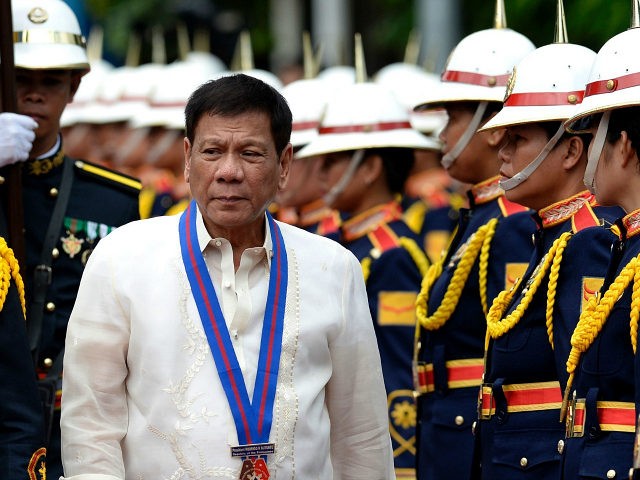President Rodrigo Duterte of the Philippines has warned imprisoned Chinese drug lords — and those still at large who have since left the Philippines — not to continue to disturb the peace in his nation, warning them that, should they remain active in the drug trade, “you will die.”
Duterte, who won the presidency on a law and order campaign and eradicated drug crime as mayor of southern Davao city for two decades, named three major known drug traffickers operating in the country during a televised speech. The three — Peter Co, Peter Lim, and Herbert Colangco — are of Chinese origin, and only Lim is currently not in prison.
“Peter Co, do not escape from prison. You will die. Colangco, never try to go out of prison. You will die,” he announced. To Lim, he said, “Better tell him not to come back to the Philippines anymore. The moment he steps out of the plane, he will die.”
According to the regional news outlet Rappler, the two imprisoned drug traffickers are believed to still be active, running their business from within prison. High-profile drug lords are often able to bribe police officers to allow the practice to go on.
Duterte also accused corrupt police of “destroying the youth of the land” by cooperating with drug gangs. “Talagang binabastos tayo [They are really disrespecting us],” he continued, “…My appeal to them, since they are beyond redemption, they can stop and commit suicide because I will not allow these idiots to run their show.”
On Friday, speaking to a Muslim audience celebrating the end of the Ramadan holy month, Duterte reiterated that police who allow drug operations to occur would be prime targets for him. He announced that investigations were underway to charge them with drug trafficking crimes, this time not naming the suspects. “I am not condemning them. They deserve an investigation, but I cannot wait,” he said.
The police chief of Central Luzon province, north of Manila, confirmed on Friday that law enforcement authorities have evidence linking at least 100 police officers to drug trafficking. Chief Supt. Aaron Aquino asserted that the police have been serving as both “protectors or pushers,” and that all would be relieved of their duties while investigations are ongoing, as they cannot yet be taken into custody due to a lack of sufficient evidence against them.
Earlier this week, Duterte fired some of the nation’s highest-ranking police officers, accusing them of drug ties. Two of the five accused were retired but are now under investigation.
The emphasis on both police and specifically Chinese drug traffickers comes at a time in which Duterte will have to navigate a delicate foreign relations situation: the verdict of the Permanent Court of Arbitration at the Hague over the territorial dispute between China and the Philippines in the South China Sea. The case was filed by the administration of his predecessor, Benigno Aquino, whose close ties to the United States and insistence that China’s usurpations in the Spratly and Paracel Islands were illegal greatly incensed the Chinese government.
Duterte has claimed that he expects the Philippines to win the case but has vowed dialogue with Beijing. “For the West Philippine Sea, we remain optimistic that the judgment will be in our favor and if it’s not we will accept it as part of the country that honors international commitment by the United Nations Convention on the Law of the Sea (Unclos),” he said this week.
“When if it’s favorable to us, let’s talk. We are not prepared to go to war. War is a dirty word now,” he added.
The Chinese government, meanwhile, has launched a propaganda campaign to discredit the Philippines, touting the endorsements of nations such a Zimbabwe, Gambia, Afghanistan, and Pakistan to their claims in the South China Sea. China claims parts of the South China Sea that overlap with the sovereign territory of the Philippines, Vietnam, Malaysia, Brunei, and Taiwan. As China does not recognize Taiwan as a sovereign nation, it uses Taipei’s claims of ownership to bolster its own.
Beijing has nonetheless softened its tone with Duterte, expressing satisfaction with his disposition. “We hope that the new Philippine government will work in unison with us, veer away from the wrong path taken by the former government, return to the right track of having dialogue and consultation with China, and make tangible efforts to improve and develop China-Philippines relations,” Chinese Foreign Ministry spokesman Hong Lei said of the impending verdict this week.

COMMENTS
Please let us know if you're having issues with commenting.